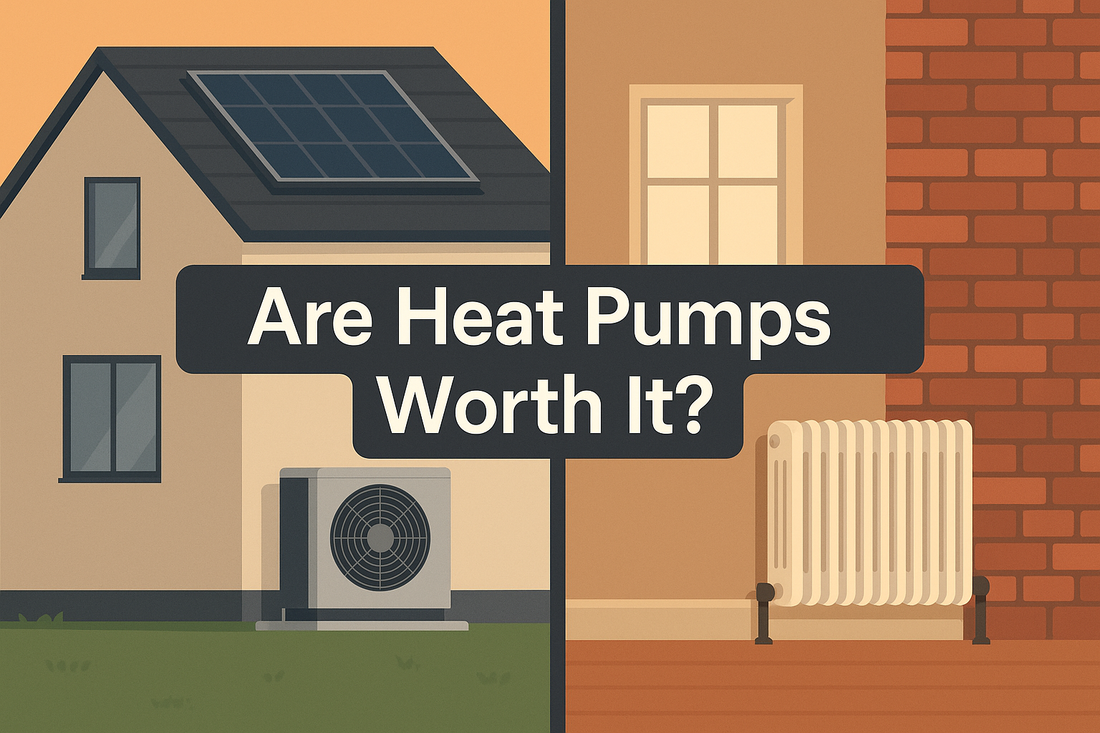From the Daily Mail to the Houses of Parliament, the debate over heat pumps rages on. Some people rave about their energy efficiency; others complain they just don’t work. So—what's the truth? And why should you care what I think?
First Things First: My Background
I am a Gas Engineer in Huddersfield. Like most plumbers, gas engineers, heating engineers—whatever you want to call us—I come from a gas background. You might think that makes me biased, but that couldn’t be further from the truth. If heat pumps are the future, then that’s good news for everyone in the industry. It means opportunity.
But before we go too far, we need to separate two very different scenarios:
Scenario 1: New Builds
When it comes to new builds, I’m 100% convinced that heat pumps are the future.
Why? Because new buildings are airtight, well-insulated, and designed with energy efficiency in mind. They’re air tested, fitted with thermally efficient windows, and packed with insulation—from the floor to the roof. All of this means they require far less heat to stay warm, especially when paired with underfloor heating.
Underfloor Heating: A Perfect Partner
Is underfloor heating better than radiators? That’s a whole topic on its own. But here’s what matters: underfloor heating works brilliantly with heat pumps.
Heat pumps operate at lower temperatures than gas boilers, and underfloor systems are designed to spread that low heat evenly across a larger surface area. Think of it like this: instead of one small wall-mounted radiator, your entire floor becomes a giant radiator. The result? Consistent warmth—and greater efficiency.
Scenario 2: Retrofitting Older Homes
Now here’s where things get tricky.
Retrofitting a heat pump into an older property can be challenging. These homes often lack the insulation needed for a low-temperature heating system to work efficiently. That’s when we start seeing the negative press. If someone slaps a heat pump into a poorly insulated house without upgrading radiators or checking pipework, of course it’s going to perform badly—and cost a fortune to run.
Let’s break that down.
Heat pumps run at lower temperatures than gas boilers. That means we need more surface area to deliver the same amount of heat. If your old radiator just about delivered enough heat at 80°C, then it’ll need to be twice the size (or double panel) to do the same job at 40°C.
Will you need new radiators? Possibly. It depends how your home was originally set up. If your radiators are oversized already, you might be fine. But more often than not, yes—you’ll need to upgrade.
And then there’s the pipework.
Gas systems are pretty forgiving. You’ll often find homes running just fine on 15mm pipework, even if they probably shouldn’t. But heat pumps are less forgiving. In worst-case scenarios—like homes with microbore (10mm) pipes buried in walls—you could be looking at a major, messy overhaul.
Costs, Savings, and ROI
Now let’s talk money.
Let’s say you’re eligible for the government subsidy. You pay £2,000, and the government covers £5,000. According to Google "A heat pump can save a UK household between £106 and £550 per year on heating costs compared to a gas boiler, depending on the heat pump's efficiency and the energy tariff used" So to get a return on investment of £2,000 it will take you between 3.6 to 18.8 years hmmmm.. Thats quite the variable!
But—and it’s a big “but”—those savings depend on proper installation and insulation. If corners are cut, or your installer doesn’t assess your home thoroughly, your savings could vanish.
There are plenty of YouTube videos showing people saving between £20 and £80/month, but keep in mind: weather, habits, and home size all vary. It’s not an exact science.
Also remember: heat pumps use electricity, which is roughly 3x the price of gas (tariff depending). Yes, you might get 3x the output per unit of electricity, but the cost could still end up being similar—unless your system is optimised.
Practical Considerations
Let’s not forget about cylinders. Most heat pump systems need a hot water cylinder. If you’ve already got space for one, great. If not, where's it going to go? Your kitchen? Bathroom? Living room corner?
Then there's the noise. Heat pumps aren’t loud, but they do have a fan. If your unit is right outside your window—or worse, you're on a terraced street with 50 heat pumps humming in unison—you might notice it.
So, What’s the Verdict?
If you're building a new home? Go for a heat pump. It makes total sense.
If you're gutting an old home for a full renovation? Then yes, it's worth considering—especially if you’re improving insulation and reworking the heating system from scratch.
But if you live in an older, already-decorated, reasonably comfortable home? Personally, I wouldn’t recommend it. Not yet. It’s not that heat pumps are bad—it’s that they need the right environment to shine. Too many people are being sold heat pumps without being told about the extra work (and cost) involved.
Final Thought
There are good installers out there who will do it properly. One of the best groups I’ve come across is The Heat Geeks—check out their YouTube channel if you want the deep-dive, technical perspective.
Just make sure you get honest advice, not a rushed install for the sake of claiming the government grant. Because once that heat pump's in, it’s in—and if it’s not done right, it won’t be cheap to fix.



